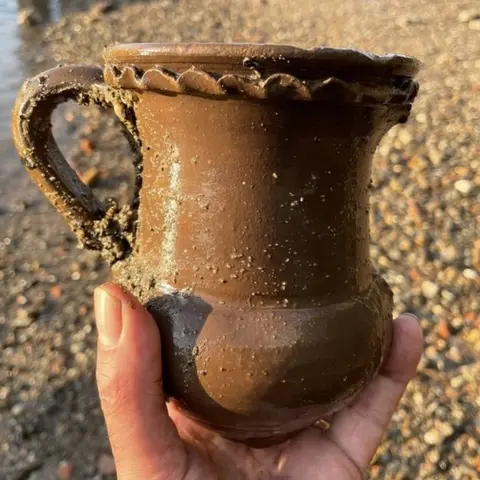Mudlarker discovers cup in Thames that may be rare Roman find
 Malcolm Russell
Malcolm RussellA mudlarker says he has been told he has found a "rare" near-complete Roman cup from the banks of the River Thames.
Malcom Russell, 49, from London, pulled the artefact from the mud when he ventured out last week, during some of the lowest tides of the year.
He said Museum of London archaeologists believed the object might date back to the 2nd Century AD.
Mr Russell said it was "high up" on his "list of dream finds", and his Twitter post about the find had gone viral.
Popularised by the Victorians, mudlarking involves going down to the banks of the Thames at low tide and searching for interesting historical objects.
Mr Russell, who is from Walthamstow in east London and has been mudlarking for seven years, says he "was excited about what might turn up" because "when the tide is super low obviously more of the riverbed gets exposed and you stand a greater chance of finding things".
Allow X content?
Despite this, he said after a few hours he still had not found anything - until he saw "a dark patch under about half a metre of water".
"Normally you only find fragments of Roman pottery, little bits and pieces," he said, "but I started to reach down into the water and pulled on the handle of this bit of pottery and it sort of just kept on going - and then suddenly in my hands I had a mostly complete Roman vessel."
He continued: "I was so astounded and excited at the time that I nearly dumped all of the mud and sand out of it that was inside, but I was reminded of a friend who said you shouldn't do that because the Museum of London like to X-ray complete pots to see whether they've got any original content in."
'1,800 years old'
He added he had only ever seen a couple of things that size turn up in the past seven or eight years.
"When you think that over time it's broken or it gets rolled around in the river and smashed up, it's miraculous that something that complete could survive," he said.

Notable Thames finds:
- A 5,000-year-old human leg bone
- A 15th Century skeleton wearing thigh-high boots
- More Roman treasure, including a decorative oil lamp
- A fragment of Neolithic human skull

He explained that although the vessel was missing one of its handles, he had contacted the Museum of London to see if they were interested in examining it.
He says archaeologists told him it looked like "a rare find", and although no original contents were found in the cup, it was likely to be more than 1,800 years old.
He said: "They have discovered it is most likely a contemporaneous copy inspired by a much more expensive type of vessel made along the River Rhine in the 2nd Century AD. So it's kind of like a super bargain basement version of a vessel that was made then.
"The museum said they hadn't identified another example that's ever been found in this state from mudlarking in London," he added.
Mr Russell said experts believed there was "certainly a very good chance it would have been used for wine or another liquid".
 Matthew Williams-Ellis/Thames & Hudson
Matthew Williams-Ellis/Thames & HudsonDiscussing what motivated him to go mudlarking, he said: "Everything I find is little portals into the past, and something that complete is very evocative, it sets your mind racing as to what was it used for, who were the last hands to touch it before it ended up here, why was it thrown away, it's very rich fodder for the imagination really.
"It's contributing to our knowledge of London's past. It definitely excites me, you don't just find this stuff for yourself, you find it so everyone can learn from it."
It is unclear whether the museum intends to keep the artefact once its provenance is confirmed, but Mr Russell said he would happily donate it to their collection.
The Port of London Authority says a valid permit is required for anyone wishing to search the Thames' muds.
A spokesperson for The Museum of London said: "The object has been handed to the Finds Officer at the museum.
"We're not able to comment on it at this stage until some initial research and analysis has been done."

Follow BBC London on Facebook, Twitter and Instagram. Send your story ideas to [email protected]
